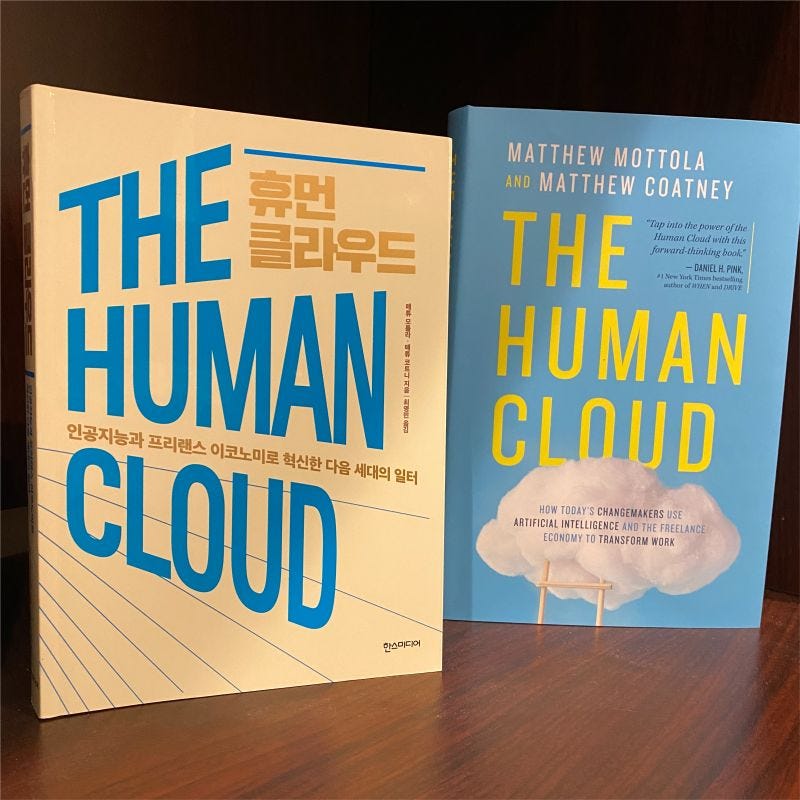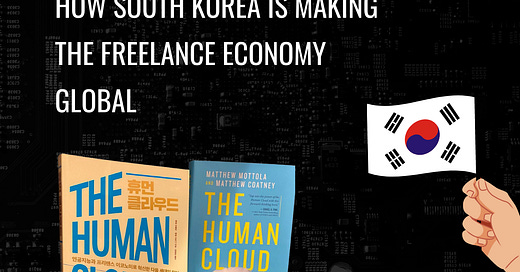N-Jobers: How South Korea Is Making The Freelance Economy Global
South Korea is quickly rising in it's reception to the Human Cloud. But will it look the same there as it does here? Let's discuss.
Leaders,
1: How funny does Luca look?
2: We’ve seen an organic increase in interest of the Human Cloud out of South Korea.
A couple months ago we found this awesome book review (if anyone knows this guy, can you please tell him we’ll buy him Japchae for life!!).
Then this past week we received an interview request from one of their largest business publications.

Why We’re Not Surprised
Our space has an inherent global footprint. Whether in the US, the EU, or South Korea, all that’s needed is a Wifi connection to create deep working relationships and drive insane change.
But why the freelance economy and not remote? I think it’s because:
We’re inherently remote
We’re inherently outcome driven
We’re inherently hyper meritocratic
*Sidenote: I moved to Singapore in 2020 to test out how truly global remote work is. My learnings…remote work isn’t inherently global. Instead the freelance economy, specifically it’s focus on A-Sync and Remote, are much more inherently feasible.
🙌 Welcome South Korea and The N Jober
There’s plenty of confusing terms describing the shift away from full time first and office first to contract first, remote first, and independent first.
Freelance economy
Gig economy
Expect economy
Independent economy
Crowdsourcing
Open Talent
Etc…
South Korea calls us N Jober’s, which I guess means we’re the N Jobber economy?
In their words:
“N Jober is a new word combining the alphabet 'N', which means plural of two or more, 'job', which means job, and '~r' (er) which means person”.
Honestly I don’t hate it as much as a “Gigger” or the ‘gig’ economy, but it definitely leaves room for questioning.
But will it look like what we’ve seen in the US and increasingly European freelance markets?
Let’s give you a sneak peek of only some of their questions, give you another sneak peak of some of our answers, then kick the discussion to our community.
*Stay tuned for the full interview)
1. In Korea, a person who has 2 or 3 jobs is called a 'N jober'. What do you call these people in America?
Common names for people that work on multiple different engagements full time, or have a full time job and work on multiple engagements as well (estimate over 57 million individuals in the US) are:
Freelancers
Consultants
Solo-preneurs
Independent Experts
Independent Contractors
The list goes on and on, but the commonality is:
Remote first
Contract first (generally with deliverables and outcomes as the metric of success)
Expert in a specific set of outcomes/deliverables
2. What are common statistics and characteristics?
HERE is a great resource of all related stats.
At least over 57 million Americans.
It’s projected that 86.5 MIL. of the US workforce will be independent freelancers by 2027 (STATISTA).
68% of newcomers were Gen Z or millennials, and 55% of newcomers were female (MBO).
Common characteristics:
Skill sets that can be delivered in a project format
Example: A digital marketer can deliver an SEO audit, run SEO campaigns. Or a developer can build a website.
Entrepreneurial, specifically being comfortable in selling and managing client relationships.
Tangible experience in a specific skill or industry.
Example: 3+ years as a designer. 3+ years as a developer with experience in companies like Microsoft, Google, etc
3. Your own N jobbing seems to be busy and difficult. Do you have your own know-how?
My only principle I’d recommend to everyone is to align each project/opportunity so that every hour you spend feeds the other hours.
For me, I work around 60 hours a week, and the hours I spend on each different project accelerate the impact I can make with all my projects. I wouldn’t be able to do this if each project wasn’t aligned with the same industry and similar problem statements.
Example: My work as an independent contractor helping enterprises accelerate freelance programs gives me insights I directly apply to helping freelancers. Likewise, the insights gained from The Human Cloud podcast feed my role helping freelancers and helping leaders hire freelancers.
4. What are common traits for successful N-jobers?
They all understand and can quantify exactly what they’ll do. Instead of time to onboard, they immediately scope what they’ll do, how long it will take, and how much it will cost.
They all are experts at their craft, whether writing, video production, design, etc
5. N-jobers are increasing. What do you think is the reason, and how has Covid impacted the gig economy?
This could be it’s own interview in itself. My quick answer:
What constantly pops up in the data, is that taking on multiple projects, whether as a full time freelancer, or a full time employee with freelance projects, gives you more income, gives you more freedom, and provides better protection than having only one employer.
Refer: University of Toronto and Jon Younger Global Freelancing Study
There’s 3 main forces that drive this. For each force, Covid simply accelerated the trend that was already happening by forced exposure to remote and forced exposure to the lack of security with one employer.
Technology: Technology, specifically collaboration tools like Zoom/Teams/Google Workspace and small business tools like Quickbooks, has made it easy to take on multiple projects whether as a full time freelancer, or a full time employee with freelance projects.
Economically: This one’s easy, you make more.
Socially: It’s increasingly more acceptable.
Refer: Why 2021 Was The Catalyst For The Human Cloud
6. How do you think the concept of work is changing in relation to the growing number of people with side jobs?
I think we all want the same thing - enough money, interesting work, and choice. Before the internet and cloud computing, a job with a large company was the best option. Now it’s not.
7. How do US companies view their employees' side jobs?
Depends on industry, skills, and location. Coastal tech companies are okay with it yet still have outdated ‘moonlighting’ policies in their contracts.
It really comes down to need and leverage. Historically top performers have always had leverage and could command favorable terms.
The freelance economy broadens the base of top performers while making their demands more reasonable. Thus making it easier for both individuals and employers to offer more remote, project based models.
8. Will the number of people with side jobs increase in the future? How do you see the future labor market?
It will only increase. But I don’t expect to see exponential growth like typical tech companies.
Reference: Why’s The Freelance Economy Moving Slower Than We Thought?
8. What are your plans for the future?
I’ll always be making the freelance economy a sustainable career path. For me it’s more than money or even the opportunities at hand. It’s about building a sustainable economy where every individual that works hard can put their family first.
With that said, my priorities are:
Helping individuals build their freelance career.
Helping leaders build their freelancer bench so they can drive their companies and teams.
Helping the next generation of entrepreneurs build businesses that will push our space forward.
Other Fun Stuff
Jon Younger’s Leader Portal is LIVE
All Stats are LIVE
Stay tuned, more exciting stuff next week!
No Matter Where In The World You Are, Ready To Start N-Jobbing?
For paid members, access below in your portal (linked below paywall):
Proposal Template
Sales and Operations Dashboard
Onboarding Template
Don’t feel like paying? Start the free trial, download the templates, then cancel. As a freelancer that’s what we do with most of these freelancer productivity solutions anyway lol
Keep reading with a 7-day free trial
Subscribe to The Human Cloud to keep reading this post and get 7 days of free access to the full post archives.









